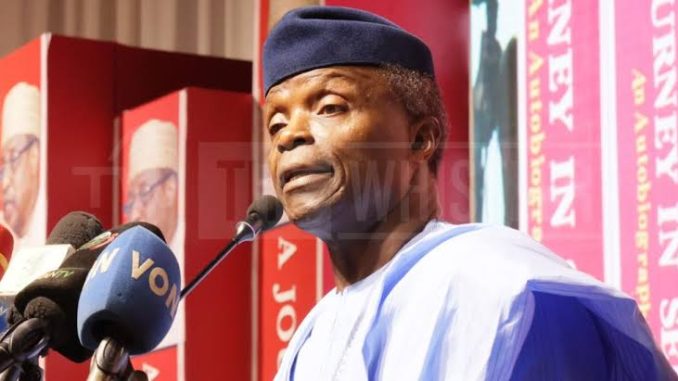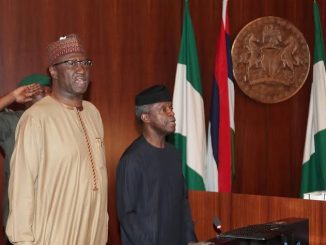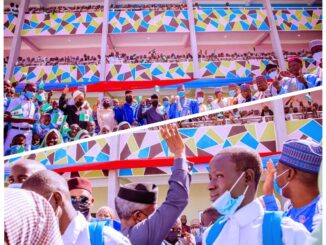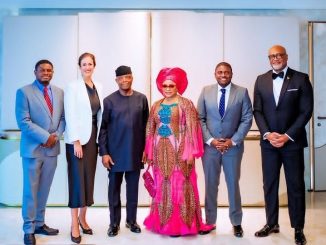
By Gideon Maxwell
February 20, 2025
Nigeria’s former Vice President, Prof. Yemi Osinbajo, SAN, has described the autobiography of former military president, Gen. Ibrahim Badamasi Babangida, Journeys in Service, as a profound account of Nigeria’s political history, encapsulating the complexity and intrigue of the nation’s governance.
Speaking at the book launch on Thursday, February 20, 2025, Osinbajo highlighted the significance of the book, noting that it is not merely Babangida’s personal story but a narrative that mirrors Nigeria’s own journey, one filled with unpredictability, remarkable leadership transitions, and historical reconciliations.
“Many of the key figures in this book who shaped the history of our country are here with us today, demonstrating something truly unique about Nigeria: our ability to move beyond the past and come together,” Osinbajo remarked.
He pointed out the presence of several past and present leaders at the event, underscoring how former adversaries have evolved into colleagues and statesmen celebrating one another.
Among those present was Gen. Yakubu Gowon, who became Head of State at 32 but was later overthrown in 1975 by a coup involving key military figures, including Babangida.
Also in attendance were former President Olusegun Obasanjo, Gen. Theophilus Danjuma, and former President Muhammadu Buhari represehted, all of whom had shared intertwined military and political histories with Babangida.
Osinbajo particularly noted the presence of President Bola Ahmed Tinubu, describing his attendance as a striking illustration of Nigeria’s evolving democratic landscape.
“Here today is a gentleman who was an elected senator in 1992 under Babangida’s transition programme. When Babangida annulled the 1993 election and Gen. Sani Abacha took over, he (Tinubu) resisted the dissolution of the Senate, was detained, charged to court, and eventually went into exile.
“Today, that man is here, not as an exile, but as the President and Commander-in-Chief of the Armed Forces of the Federal Republic of Nigeria,” Osinbajo observed.

Highlights IBB’s regret over June 12 annulment
Osinbajo, also describing Babangida: A Journey in Service as an essential historical account, particularly in its revelations about the annulment of the June 12, 1993, presidential election, noted that the autobiography offers unprecedented insights into the transition from military rule and the consequences of the annulment, which he termed a decision with “cataclysmic consequences.”
ALSO READ: How to persuade people to change their behaviour
“The annulment led to a military interregnum considered one of the most vicious in Nigeria’s history and resulted in the tragic deaths of the acclaimed winner, Chief MKO Abiola, and his wife,” Osinbajo stated.
According to him, the book provides, for the first time, a detailed account of the events surrounding June 12, including the identity of those responsible for the annulment. However, he urged Nigerians to read the book to discover the full details.
Significantly, Babangida acknowledges Abiola’s victory in the election, overturning his previous stance. Osinbajo quoted him as saying:
“Although I am on record to have stated after the elections that Abiola may not have won, upon deeper reflection and a closer examination of all the available facts, particularly the detailed election results published as an appendix to this volume, there was no doubt that MKO Abiola won the June 12 elections. Upon closer examination of the original collated figures from the 110,000 polling booths nationwide, it was clear that he satisfied the two main constitutional requirements for winning the presidential elections, mainly majority votes and geographical spread, having obtained 8,128,720 votes against Tofa’s 5,848,247 votes and securing the mandatory one-third of the votes cast in 28 states of the federation, including Abuja… I am gratified that the Buhari administration finally recognised him as a former head of state.”
Osinbajo further highlighted Babangida’s candid admission of regret over the annulment, quoting him:
“Looking back now, the June 12 saga was undeniably the most challenging moment of my life and, in certain respects, one of the most painful… If I had to do it all over, I’d do it differently.”
The enigma of Babangida
Osinbajo further stressed the book’s importance in unraveling Babangida’s persona, a man long regarded as one of Nigeria’s most enigmatic leaders.
“Some call him ‘Maradona,’ others the ‘evil genius.’ Now, for the first time in 32 years, he bares his mind in writing,” Osinbajo said.
The book details Babangida’s early life, from his days at Gwari Native Authority Primary School to Government College Bida, where he was a member of the class of 1957–1962.
The class produced two Nigerian presidents, four state governors, a Chief Justice of Nigeria, and two federal ministers, including Abdulsalami Abubakar, Sani Sami, Sani Bello, and Mamman Vatsa.
Babangida recounts how he adopted his surname after officials frequently confused his middle name, Badamasi, with the Yoruba name Gbadamosi.
“To eliminate the confusion, I decided to take on my father’s other name, Babangida, as my last name,” he wrote.
The book also delves into Babangida’s military career, including his combat experience during the Nigerian Civil War and his near-death encounter in Uzuakoli, where he was severely injured by shrapnel.
It was during his recovery at Lagos University Teaching Hospital that he decided to marry his wife, Maryam Babangida, after being inspired watching right there in the hospital how Gen. Yakubu Gowon celebrated his marriage to his wife, Victoria.
Politics, Power, and Reconciliation
Osinbajo noted Babangida’s reflections on some of the most turbulent moments in Nigeria’s history, including the 1976 coup that led to the assassination of Gen. Murtala Mohammed.
Babangida, who played a key role in restoring stability, recounted his dramatic face-off with coup leader, Maj. Dimka, at the Nigerian Broadcasting Corporation.
In an extraordinary display of courage, Babangida confronted Dimka unarmed, persuading him to stand down despite the threat of being taken hostage.
Osinbajo also highlighted Babangida’s decision to restore the full military rank of Gen. Yakubu Gowon in 1986 after he had been stripped of his status in the wake of the 1976 coup attempt.
“Although I was a member of the Supreme Military Council that made the painful decision to strip Gowon of his rank, I am happy that as President, I restored his benefits and full ranks in 1986,” Babangida wrote.
A testament to Nigeria’s resilience
Osinbajo concluded that Babangida’s book provides invaluable insights into the nature of governance, the complexities of leadership, and the resilience of the Nigerian state.
“This book is not just an account of one man’s journey; it is a reflection of our collective history. It shows how Nigeria continues to evolve, how former adversaries become allies, and how our nation finds ways to reconcile with its past while forging ahead,” he said.
The book launch drew a distinguished audience, notable personalities, including past and present leaders, marking a significant moment in Nigeria’s historical reckoning with the events of June 12, 1993, and reinforcing Osinbajo’s assertion that Nigeria remains a country where political actors, despite their differences, find ways to reunite in the service of history.




